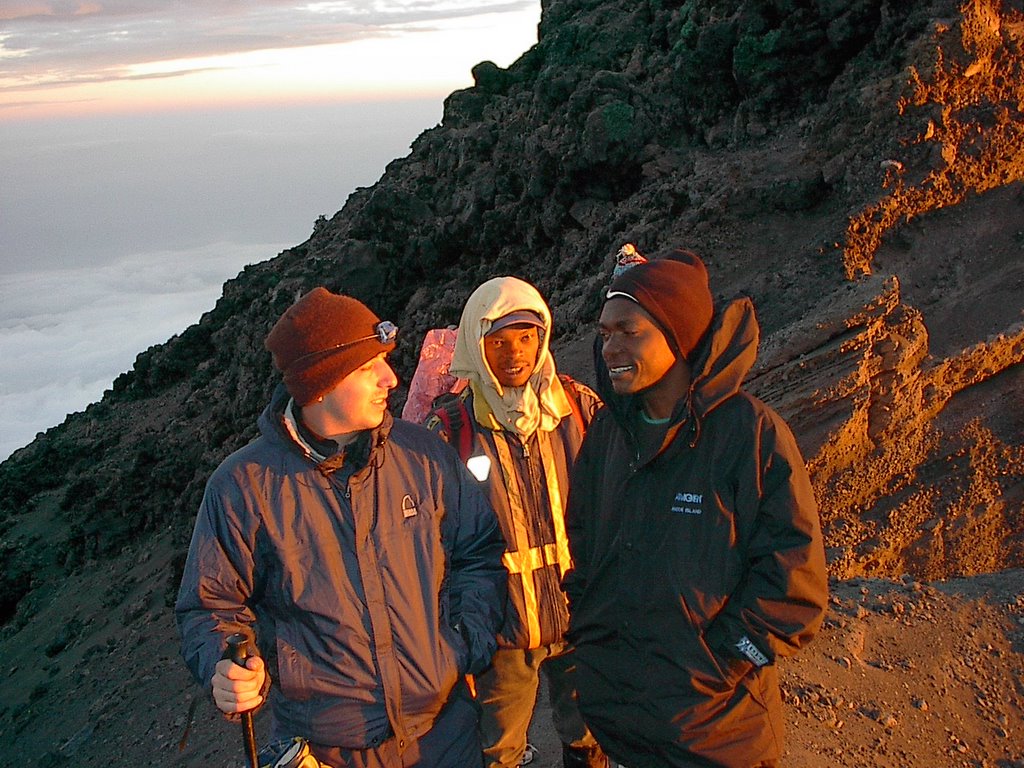Monday, December 26, 2005
Closing notes on 2005

Personally, 2005 has been a turbulent year with many ups and downs. I began the year standing on top of Mount Meru in Tanzania to see the sun rise over Africa’s highest mountain, Mount Kilimanjaro only to return home to find my relationship of seven years in ruins. I can honestly say that in my first week of 2005 I had experienced my highest high and my lowest low and there stood before me another 51 weeks of ups and downs. I then began working as a project supervisor for Canada World Youth and shortly after met another amazing person named Kai. As all seemed to be levelling out, I had to face the reality of returning home after 2 years in East Africa...my world was ounce again turned upside down. I had much to do finishing my Masters Thesis while working as a carpenter with Terry Shank whom was generous to give me a job within a week of my return. I also have had the joy of being the best man at my best friends wedding and to spend 8 months with my family and friends in Canada and to share the same stage as Stephen Lewis, the HIV/AIDS Special Envoy to Africa, and definately one the worlds top 100 influential people. And this brings me to my point.
Upon returning home from Tanzania the question that I have been asked the most is, “how was Africa?” I have found this question to be extremely difficult to answer. Africa is a vast continent of which I know little about outside of East Africa. I try to speak as honestly as possible using my experience, talking about issues of poverty, HIV/AIDS as well as the amazing people I have met. However, during this holiday season I was asked the question that I was waiting to be asked, “what have you learned from your experiences in Africa?” The following is my response.
What I have learned begins first with a realization. Within my two years in Tanzania, I have realized both the preciousness and fragility of life…regardless of race, class, creed, tribe, religion or nationality. In Sub-Saharan Africa such things as the big three killers (HIV/AIDS, Malaria and Tuberculosis), which are exacerbated by extreme poverty, has ensured that a healthy and prosperous life has become a privilege rather than an expectation. In Canada we call turning 50 middle aged, in Tanzania you become an “Mzee”, or “old wise man.”
From realization comes education. Having consoled friends, visited hospitals and attended funerals I have learned the meaning of strength…strength to persevere in the face of unimaginable obstacles that could possibly face a society physically and psychologically. And I have learned that this strength is derived from the bond of family, friends and the community.
The Makonde people who live in Southern Tanzania carve statues out of wood from the mpingo tree. The core of the wood is as dark and hard as walnut and as soft and light as ash on the outside. The artists carve statues of people standing on each other forming a circular tower.
 The people reflect the individual, the family and the community and each person is in the act of a daily activity such as fetching water or playing an instrument.
The people reflect the individual, the family and the community and each person is in the act of a daily activity such as fetching water or playing an instrument.The underlying message of the carving is, “I am because we are.” The community is made of individuals and, in turn, the individual is a reflection of the community. Joy, sadness, struggle, success, pain and illness are felt through the pulse of this relationship. Everything depends on the strength of this bond.
Many people in the rich world believe that Africa’s problems lie with its, “overpopulation.” Many ask the question, “why would impoverished African’s bring children into this world if they cannot feed them?” This is a valid question. First off all, overpopulation is not at the top of the list of Africa’s problems…Africa’s poverty is derived not from a lack in natural resources to feed itself. Plus, African’s have the same desire for family as the rest of us. But, we must realize that children also represent greater security. The more children you have the more security you have…economically and socially.
French Canadians have historically had large families for exactly the same reasons. This is the case with my family. I have a strong and healthy family because we have many people contributing to its strength. The character of each person contributes to the character of the family. When we lose a family member we feel pain because we have lost their presence, and we equally feel joy when we are blessed with a new family member because we are strengthened by their presence. Remember, “I am because we are.”
Perhaps those who play the “overpopulation card” have it entirely backwards. People living in rich countries have access to plenty of resources, but it is expensive. In turn, people have few children because of the cost of raising children. So, we try to fill this gap with consumerism. Instead of raising children, we buy stuff and we do stuff. So, why is it that far more people living in rich countries are not satisfied with their lives and feel an unexplainable emptiness? Is there a correlation between family and fulfilment? That is a book in itself.
What I am sure of is that if it was not for my friends and my family I would have had a much more difficult year. My friends and family have turned a potentially crushing year into a constructive year and I consider myself extremely lucky to have each and every one of you in my life.
